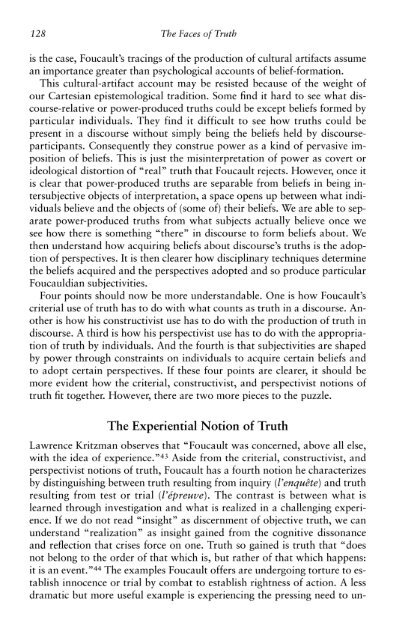Starting with Foucault: An Introduction to Genealogy, Second Edition
Starting with Foucault: An Introduction to Genealogy, Second Edition
Starting with Foucault: An Introduction to Genealogy, Second Edition
Create successful ePaper yourself
Turn your PDF publications into a flip-book with our unique Google optimized e-Paper software.
is the case, <strong>Foucault</strong>'s tracings of the production of cultural artifacrs assumean importance greatrtr than psychological accounts of belief-formation.This cultural-artihct account may be resisted because of the weight ofour Gaflesian epistemological tradition, Some find it hard <strong>to</strong> see what discourse-relativeor power-produced truths could be except beliefs formed byparticular individuals. They find it difficult <strong>to</strong> see how truths could bepresent in a discourse <strong>with</strong>out simply being the beliefs held by discourseparticipants.Consequently they construe power as a kind of pervasive irnpositionof beliefs, This is ~usthe misinterpretation 05 power as covert orideological dis<strong>to</strong>rtion of "real" tmh that <strong>Foucault</strong> rejects, However, once itis clear that power-produced truths are separable from beliefs in being intersubjectiveobjects of interpretation, a space opens irp bemeen what individualsbelieve and the objects of (some of) their beliefs. We are able <strong>to</strong> separatepower-produced truths from what subjects actually believe once wesee how there is something ""rere" in discourse <strong>to</strong> form beliefs about. Wethen understand bow acquiring beliefs about discourse's truths is the adoptionaf perspectives. It is then clearer how disciplinary techniques determinethe beliefs acquired and the perspectives adopted and so produce particularHaircauldian su bjectivities.Four points should now be rnore understandable. One is h w <strong>Foucault</strong>'scriterial use of truth has <strong>to</strong> do <strong>with</strong> what counts as truth in a discourse. <strong>An</strong>otheris how his constructivist use has <strong>to</strong> do <strong>with</strong> the production of truth indiscourse. A third is h w his perspesctivist use has <strong>to</strong> do <strong>with</strong> the agpropriatianof truth by individuals. <strong>An</strong>d the fourth is that subjectivities arc shapedby power through constraints on individuals <strong>to</strong> acquire certain beliefs and<strong>to</strong> adopt terrain perspectives. If these bur points are clearer, it should bemare evident how the criterial, constructivist, and perspectivist notions oftruth fit <strong>to</strong>gether. However, there are two more pieces <strong>to</strong> the puzzle,The Experiential Notion of TruthLawrence Kr itzrnan observes that " bocault was concerned, above all else,<strong>with</strong> the idea of experience.""" Aside from the criteria!, constructivist, andperspectivast notions of truth, Haircault has a fourth notion he characterizesby distinguishing between truth resulting from inquiry (I'engudte) and truthresulting ham test or trial (19@rt?ave). The contrast is between what islearned through invegigatinn and what is realized in a challenging experience.If we do not read ""insight9\s discernment of objwtive truth, we canunderstand ""realization" as insight gained horn the cognitive dissonanceand reflection that crises force on one, Truth so gained is truth that "doesnot belong ta the order of that which is, but rather of that which happens:it is an evente9"4 The examples <strong>Foucault</strong> offers are undergoing <strong>to</strong>rture <strong>to</strong> establishinnocence or trial by combat <strong>to</strong> establish rigbcness of action. A lessdramatic but rnore useful example is experiencing the pressing need <strong>to</strong> un-


